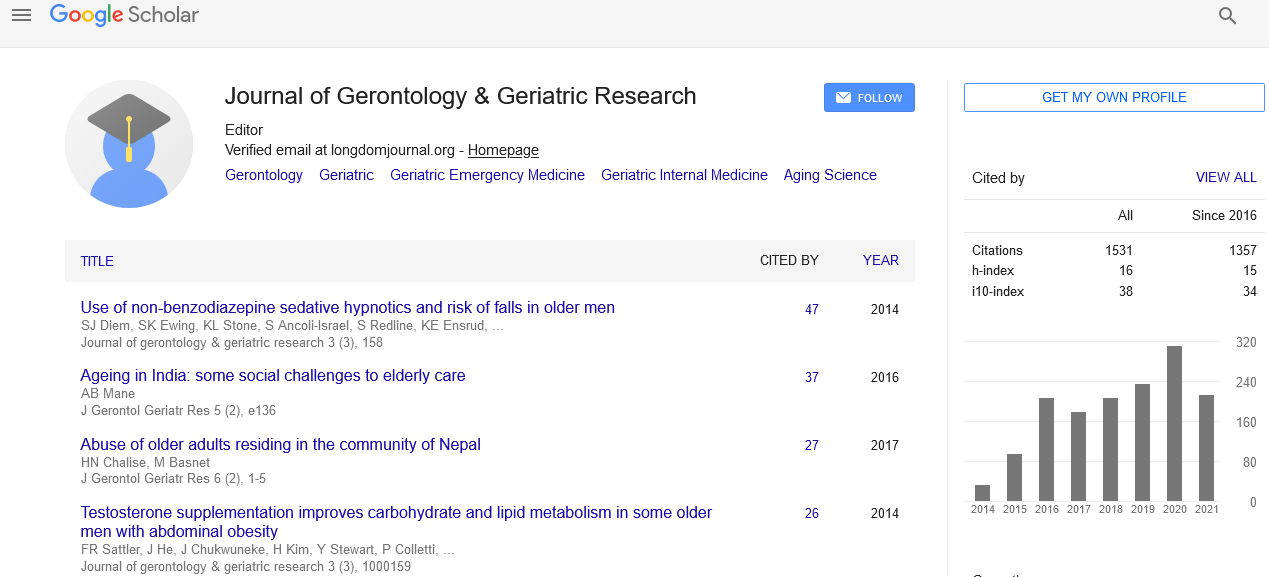PMC/PubMed Indexed Articles
Indexed In
- Open J Gate
- Genamics JournalSeek
- SafetyLit
- RefSeek
- Hamdard University
- EBSCO A-Z
- OCLC- WorldCat
- Publons
- Geneva Foundation for Medical Education and Research
- Euro Pub
- Google Scholar
Useful Links
Share This Page
Journal Flyer

Open Access Journals
- Agri and Aquaculture
- Biochemistry
- Bioinformatics & Systems Biology
- Business & Management
- Chemistry
- Clinical Sciences
- Engineering
- Food & Nutrition
- General Science
- Genetics & Molecular Biology
- Immunology & Microbiology
- Medical Sciences
- Neuroscience & Psychology
- Nursing & Health Care
- Pharmaceutical Sciences
Abstract
The Effect of Education on Quality of Life in Elderly Females with Urinary Incontinence, Refereeing to Jahandidegan Center in Shiraz-Iran, 2011
Fariba Godsbin, Marzeiah Kargar, Iran Jahanbin, Mohammad Mahdi Sagheb and Sare Keshavarzi
Background: Urinary incontinence is a common problem in elderly females. It seems to have negative effects on different aspects of the patients’ life.
Objective: To determine the effect of instruction on quality of life of the elderly females with urinary incontinence, who referred to Jahandidegan center in Shiraz-Iran, 2011.
Material and methods: A preliminary study was conducted to validate the Modified QUID (Questionnaire for Urinary Incontinence Diagnosis) questionnaire for Iranian elderly. The QUID questionnaire was primarily administrated. The subjects consisted of 60 women aged 60-74 years with QUID questionnaire’s scores for different types of incontinence (stress score ≥ 4, urge score ≥ 6 and mix score ≥ 10). They completed the I-QOL (incontinence Quality of Life) questionnaire according to incontinence types. 10 subjects from each type were placed in two groups of 30 each (experimental and control groups). 10 training sessions on aging, changes related to aging in different system of the body, function of genitourinary system, urinary incontinence, risk factor and treatment (behavioral intervention, stress management, bladder training, scheduled toileting, pelvic muscle exercises, nutrition and fluid management) were held weekly for the experimental group. After the completion of the sessions I-QOL questionnaire was completed by the experimental group and after 2 and 3 months it was completed by the experimental and control groups. Descriptive statistics, paired t-Test and repeated measurement were used to analyze the data.
Results: The I-QOL score of the participants attending the training sessions was significantly higher than that of the subjects in the control group (P=0.014).
Conclusion: Based on our findings, training has a positive effect on QOL of females with urinary incontinence. Thus, it is suggested that the health care providers pay more attention to this issue and use health care centers to train women regarding the prevention of urinary incontinence.


